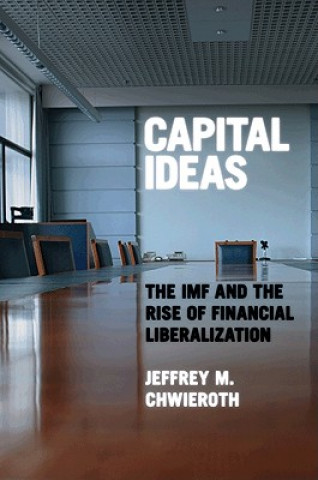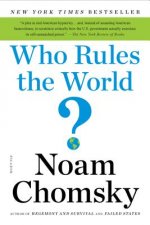
Kód: 04641622
Capital Ideas
Autor Jeffrey M. Chwieroth
The right of governments to employ capital controls has always been the official orthodoxy of the International Monetary Fund, and the organization's formal rules providing this right have not changed significantly since the IMF w ... celý popis
- Jazyk:
 Angličtina
Angličtina - Väzba: Brožovaná
- Počet strán: 352
Nakladateľ: Princeton University Press, 2010
- Viac informácií o knihe

97.51 €

Skladom u dodávateľa v malom množstve
Odosielame za 12 - 17 dní
Potrebujete viac kusov?Ak máte záujem o viac kusov, preverte, prosím, najprv dostupnosť titulu na našej zákazníckej podpore.
Pridať medzi želanie
Mohlo by sa vám tiež páčiť
-

Transactions of the Royal Historical Society: Volume 21
129.74 € -

In the Game
49 € -

Orientalism and the Postcolonial Predicament
40.72 € -

Women in Shakespeare
563.19 € -

Emergence of Monasticism - From the Desert Fathers to the Early Middle Ages
70.70 € -

Asian American Women's Popular Literature
33.04 € -10 % -

Chimera Brigade Vol. 1
11.45 € -13 %
Darčekový poukaz: Radosť zaručená
- Darujte poukaz v ľubovoľnej hodnote, a my sa postaráme o zvyšok.
- Poukaz sa vzťahuje na všetky produkty v našej ponuke.
- Elektronický poukaz si vytlačíte z e-mailu a môžete ho ihneď darovať.
- Platnosť poukazu je 12 mesiacov od dátumu vystavenia.
Viac informácií o knihe Capital Ideas
Nákupom získate 241 bodov
 Anotácia knihy
Anotácia knihy
The right of governments to employ capital controls has always been the official orthodoxy of the International Monetary Fund, and the organization's formal rules providing this right have not changed significantly since the IMF was founded in 1945. But informally, among the staff inside the IMF, these controls became heresy in the 1980s and 1990s, prompting critics to accuse the IMF of indiscriminately encouraging the liberalization of controls and precipitating a wave of financial crises in emerging markets in the late 1990s. In Capital Ideas, Jeffrey Chwieroth explores the inner workings of the IMF to understand how its staff's thinking about capital controls changed so radically. In doing so, he also provides an important case study of how international organizations work and evolve. Drawing on original survey and archival research, extensive interviews, and scholarship from economics, politics, and sociology, Chwieroth traces the evolution of the IMF's approach to capital controls from the 1940s through spring 2009 and the first stages of the subprime credit crisis. He shows that IMF staff vigorously debated the legitimacy of capital controls and that these internal debates eventually changed the organization's behavior--despite the lack of major rule changes. He also shows that the IMF exercised a significant amount of autonomy despite the influence of member states. Normative and behavioral changes in international organizations, Chwieroth concludes, are driven not just by new rules but also by the evolving makeup, beliefs, debates, and strategic agency of their staffs.
 Parametre knihy
Parametre knihy
Zaradenie knihy Knihy po anglicky Society & social sciences Politics & government International relations
97.51 €
- Celý názov: Capital Ideas
- Podnázov: The IMF and the Rise of Financial Liberalization
- Autor: Jeffrey M. Chwieroth
- Jazyk:
 Angličtina
Angličtina - Väzba: Brožovaná
- Počet strán: 352
- EAN: 9780691142326
- ISBN: 0691142327
- ID: 04641622
- Nakladateľ: Princeton University Press
- Hmotnosť: 478 g
- Rozmery: 234 × 156 × 21 mm
- Dátum vydania: 03. January 2010
Obľúbené z iného súdka
-

Prisoners of Geography
11.14 € -23 % -

On Palestine
10.63 € -18 % -

Righteous Victims
20.45 € -19 % -

Grand Chessboard
22.71 € -

Clash of Civilizations and the Remaking of World Order
16.77 € -15 % -

Rethinking Fiscal Policy after the Crisis
168.93 € -

Lords of the Desert
9.61 € -20 % -

Diplomacy
16.46 € -24 % -

World Order
11.35 € -24 % -

Legacy of Ashes
17.90 € -14 % -

Who Rules the World?
14.21 € -18 % -

Image and Reality of the Israel-Palestine Conflict
31.40 € -13 % -

Tao Of Spycraft
42.97 € -

Planetary Cycles Mundane Astrology
19.84 € -

Hundred-Year Marathon
16.57 € -22 % -

Adults In The Room
13.09 € -22 % -

Tragedy of Great Power Politics
21.48 € -9 % -

Cold War
16.87 € -22 % -

America's Secret War
15.34 € -9 % -

My Nationalist Pony
36.83 € -

PostCapitalism
10.94 € -24 % -

Drone Theory
10.12 € -23 % -

Good Spy
15.03 € -22 % -

Romania and the European Union
41.43 € -

Human Rights and European Law
108.76 € -

Second Chance
29.36 € -

Diplomatic Theory from Machiavelli to Kissinger
214.46 € -

Black Gold Spies
28.54 € -

Who Rules the World?
11.25 € -25 % -

Rise and Kill First
16.46 € -24 % -

The Spy and the Traitor
10.94 € -24 % -

PEACE TO END ALL PEACE
21.07 € -23 % -

Dead Aid
16.67 € -9 % -

Evolution of Cooperation
19.12 € -

World Order
16.46 € -3 % -

Countdown to Zero Day
16.87 € -17 % -

Political Order and Political Decay
15.24 € -23 % -

Strategic Vision
16.16 € -21 % -

Secret World
18.31 € -24 % -

Naked Diplomat
14.42 € -23 % -

After the Empire
15.95 € -

Understanding the Intelligence Cycle
77.96 € -

Revenge of Geography
18.41 € -21 % -

Oxford IB Diploma Programme: Global Politics Course Book
58.21 € -

Dawn of Eurasia
12.27 € -23 % -

Emergency Sex (And Other Desperate Measures)
16.57 € -23 % -

Diplomatic Protocol
40.31 € -

How Spies Think
10.94 € -24 % -

Post-American World
12.27 € -23 %
Osobný odber Bratislava a 2642 dalších
Copyright ©2008-24 najlacnejsie-knihy.sk Všetky práva vyhradenéSúkromieCookies


 21 miliónov titulov
21 miliónov titulov Vrátenie do mesiaca
Vrátenie do mesiaca 02/210 210 99 (8-15.30h)
02/210 210 99 (8-15.30h)